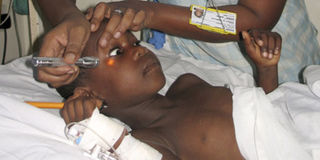Banned malaria drugs still on sale

A nurse attends to a malaria patient at the Kilifi District Hospital. Artemisinin monotherapy drugs are still readily available in several Kenyan drug stores. Photo/FILE
Drug manufacturers, importers and distributors have defied a Kenya government directive to withdraw ineffective malaria medicines.
For almost three years now, the government, acting on the World Health Organisation’s recommendations, has been pushing the pharmaceutical industry to stop manufacturing and distributing antimalarials containing single artemisinin molecules.
Artemisinin is the active ingredient in the first line antimalarials but national treatment guidelines require that the molecule be used in combination with another to avoid cases of the parasite developing resistance. The recommended treatment is known as artemisinin combination therapy.
Readily available
Although the Ministry of Public Health and Sanitation has insisted that the artemisinin monotherapy drugs have been withdrawn from the market, a spot check by the Nation in Nairobi on Tuesday showed these are readily available in almost all drug stores.
WHO has been strongly opposed to the distribution of the monotherapies across the world and has previously reprimanded some 40 pharmaceutical companies, including several in Kenya, against the manufacture and distribution of the drugs. WHO confirmed the emergence of a drug-resistant malaria strain on the border of Thailand and Cambodia.
This development raised fears that the problem could spread to Africa as it has happened in the past when the world lost both chloroquine and sulphadoxine-pyrimethamine (SP) drugs such as Fansidar to resistant malaria parasites.
The SP drugs are only supposed to be sold to prevent malaria among pregnant women. They are also supposed to be labelled and a pharmacist is required to advise the client accordingly. But the ones bought by the Nation crew in Nairobi were not labelled, neither did the attendant offer advice on who should use them.
“If the same thing happens again, the spread of a resistant parasite from Asia to Africa, it will have devastating consequences for malaria control,” says Prof Nick Day of the Mahidol-Oxford Tropical Medicine Research Unit, who headed the Thailand/Cambodia study.
In March last year, the Pharmacy and Poisons Board held a meeting with the Federation of Kenya Pharmaceutical Manufacturers, Kenya Association of Pharmaceutical Industries, importers, exporters, distributors and wholesalers on when to do away with monotherapies.
Armtwisted
However, the government was arm- twisted to give the industry until September 30, 2008, to clear remaining stocks in their stores. “During this additional period, importation of the products referred to in the above circular will not be allowed,” says a letter from the board written last April.
But the monotherapies, SPs and substandard antimalarials are still on the market. The government is aware of this, according to an unpublished report “Antimalarial Medicines in Kenya: Availability, Quality and Registration Status”, compiled by government officials, the University of Nairobi and WHO consultants last November.
It says the local market has more than 113 brands from 20 countries.
Reacting to news that the parasite had become resistant to artemisinin, the head of malaria control in the Ministry of Public Health and Sanitation, Dr Elizabeth Juma, said there is no cause for alarm as the problem had not reached Kenya.




